#Lorenzo de’ Medici Press
Explore tagged Tumblr posts
Text
ISABEL BURTON - Verso l'India.1879 - Lorenzo de’ Medici Press
ISABEL BURTON – VERSO L’INDIA. 1879 traduzione di Simona Bauzullo Il viaggio di Isabel Burton dall’Inghilterra – attraverso l’Europa e l’Italia – verso l’India.Una donna dell’età vittoriana che osserva con attenzione e spirito critico la realtà che la circonda Lorenzo de’ Medici Press Per la prima volta in italiano, il diario di viaggio scritto da Isabel Burton nel viaggio compiuto assieme al…

View On WordPress
#Isabel Burton#LdM Press#Lorenzo de’ Medici Press#traduzione di Simona Bauzullo#Verso l&039;India 1879
0 notes
Text
Isabel Burton "Verso l'India 1879", Lorenzo de' Medici Press
Il viaggio di Isabel Burton dall’Inghilterra – attraverso l’Europa e l’Italia – verso l’India.Una donna dell’età vittoriana che osserva con attenzione e spirito critico la realtà che la circonda traduzione di Simona Bauzullo Lorenzo de’ Medici Press Per la prima volta in italiano, il diario di viaggio scritto da Isabel Burton nel viaggio compiuto assieme al marito, il celebre esploratore…

View On WordPress
0 notes
Text

Savonarola's women
Sarah A Smith enjoys the painterly textures of Sarah Dunant's quattrocento Florentine tale, The Birth of Venus
The Birth of Venus by Sarah Dunant
Genre writing has provided fertile ground for feminist fiction. Detective stories, thrillers and historical novels have been pressed into service to explore gender-based issues of psychology, morality and injustice. Sarah Dunant, the author of eight widely praised thrillers, has switched allegiance with The Birth of Venus, a seductive and ambitious novel set in late 15th-century Florence.
Dunant's themes are archetypal: women and self-determination, women and creativity, women and marriage, women and God. Her spirited heroine, 14-year-old Alessandra, has a lineage that stretches back to the earliest novels by women: not pretty, but handsome; poor at dancing, but brilliant at Latin and Greek; she lives for art rather than romance, but is still susceptible to emotion. The antecedents of The Birth of Venus are clear, and sometimes quite recent - the picture Dunant draws of convent life as a "republic of women" at the book's close owes something to Michèle Roberts. The puzzle is, how has Dunant created a story that is so fresh, vibrant and utterly compelling?
Part of her success lies in the setting. The last 10 years of the quattrocento were politically tumultuous for Florence. The city's ruler, Lorenzo de Medici, died in 1492, leaving a void his weak son Piero could scarcely fill. The Dominican reformer Girolamo Savonarola held the populace in his sway for four terrifying years, preaching against moral corruption, material wealth and women (whom he banned first from church and then from the streets). All of this is eagerly dissected by Alessandra and her middle-aged husband Cristoforo, himself a political player and in mortal danger from "God's militia". And it is tempered with just enough detail (the prostitutes with their regulation bells, the lemon paste used to whiten Alessandra's inky hands) to prick one's imagination.
But when one thinks of Renaissance Florence, one thinks of art, and it is through her descriptions of frescoes and altar pieces, painted wedding chests and fine linens that Dunant hooks the reader. The colours, the textures, the feel of the brush in Alessandra's uncertain hand as she paints a figure in her family's newly commissioned chapel; all are so vividly realised it is hard not to share the heroine's intoxication. This book is a love letter to the glories of the city (the writer now divides her time between Florence and London), and an extremely persuasive one.
If the historical aspect of the novel is a departure for Dunant, she utilises the narrative skill she developed writing mysteries. Sometimes this can go awry: the subplot involving the murder of several sexual miscreants is not especially convincing, and the book's denouement is hurried and unlikely. But for the most part this author knows how to turn a plot, whether she is writing about the unravelling of complex family tensions or the nearly disastrous impact Savonarola has on an impressionable artist brought to the city from the Low Countries.
With its painterly background (Michelangelo has a shadowy role) and its heart-thumping emotional twists, this book could easily have been self-indulgent. Dunant's passionate knowledge of her subject, the fluidity of her prose and her commitment to storytelling instead make it an accomplished delight.
3 notes
·
View notes
Link
0 notes
Text
Francis Scott Fitzgerald, I racconti dell’ “Esquire”
La rivista Esquire Francis Scott Fitzgerald, I racconti dell’ “Esquire” è un’interessante iniziativa della casa editrice Lorenzo de’ Medici Press che delizia il pubblico dei classici con una serie di racconti del grande scrittore statunitense. Francis Scott Fitzgerald è noto al grande pubblico italiano specialmente per i suoi romanzi più famosi come Grande Gatsby, Tenera è la notte, o Il curioso caso di Benjamin Button ma, come specifica Silvia Rotondo (sua la traduzione e prefazione), “negli anni Trenta, Fitzgerald era più conosciuto per i racconti che per i romanzi”. LEsquire era una rivista per la quale Fitzgerald pubblicò una serie di racconti dal 1936 al 1940. Lo scrittore dovette mantenersi economicamente e quindi iniziò a scrivere non solo per l’Esquire, ma anche per altre riviste molto popolari. A suo dire, ciò gli avrebbe consentito di avere più tempo per scrivere i suoi romanzi e di avere un’entrata costante per pagare le cure psichiatriche della moglie Zelda. Ringraziamo Silvia Rotondo per questa bella intervista su Francis Scott Fitzgerald, I racconti dell’ “Esquire”. Il suo contributo ci ha consentito di capire qualcosa in più sul grande scrittore americano e sull’ affascinante e complesso mondo della traduzione. Intervista a Silvia Rotondo: FRANCIS SCOTT FITZGERALD I RACCONTI DELL’ «ESQUIRE» Nei racconti dell’Esquire che lei ha tradotto, c’è qualche elemento che le è saltato all’occhio rispetto ai romanzi? Ha percepito qualche differenza nella scrittura di Fitzgerald tra le due forme narrative? Per spiegare le differenze stilistiche e narrative all’interno delle opere di Fitzgerald si deve prima comprendere il “fine” a cui l’autore aspirava: come già accennato nella prefazione, Fitzgerald iniziò a scrivere racconti brevi per avere un reddito sufficiente, a suo dire, a scrivere romanzi degni di nota. Inoltre, l’autore capì che poteva usare i racconti come un vero e proprio laboratorio per i suoi romanzi, sperimentando in essi temi e tecniche – e anche scelte stilistiche - che avrebbe poi incorporato nelle sue opere. Per essere più precisi, si può notare come i romanzi di Fitzgerald siano accumunati da uno stile qualitativo elevato e uniforme con – ovviamente – un inizio, una parte centrale e una conclusione, in contrasto con lo stile dei racconti brevi, più disomogeneo e sperimentale e spesso privi di una trama generale o di una parte centrale e/o finale, ma non per questo meno capace di fornire capolavori come Tre atti musicali e Finanziare Finnegan. L’ Esquire imponeva allo scrittore una certa linea tra cui, specifica lei nella prefazione, anche narrazioni senza trama. Ce ne sono nel libro? Secondo lei lo scrittore era a suo agio quando scriveva in questo modo? Ovviamente Fitzgerald dovette seguire le linee guida redazionali dell’Esquire. L’elemento principale a cui si dovette adeguare fu – come si può ben comprendere – la lunghezza dei suoi scritti, che portò dunque ad un ridimensionamento della trama in generale: con così poche parole a disposizione non poteva dilungarsi sui personaggi, sulle storie d’amore o sulle descrizioni tipiche dei suoi romanzi e, in generale, dei suoi scritti. È anche per questo motivo che Fitzgerald imparò a scrivere un tipo di narrazione diversa dal suo solito. Un altro elemento a cui l’autore si dovette adattare è raffigurato a pieno da Un saluto da Lucy ed Elsie, presente nell’Appendice del libro: questo racconto infatti fu inizialmente scartato dall’Esquire per elementi troppo anticattolici che, a detta dell’editore, dovevano essere limati o rimossi. Fitzgerald tentò di rivedere la storia, ma la abbandonò, lasciandola incompiuta. Ma la disciplina imposta da questi nuovi requisiti fu probabilmente positiva per Fitzgerald: imparò a scrivere nel suo "stile tardivo", la prosa spoglia e compressa che si ritrova in The Last Tycoon, il romanzo a cui stava lavorando prima della sua morte. Rispetto ad altri scrittori che ha tradotto, cosa le piace di Fitzgerald? È sempre un’emozione tradurre un autore della portata di Francis Scott Fitzgerald, a prescindere dal tipo di scritto e dalla sua lunghezza. Lo spiegano perfettamente tutti gli studiosi esperti di letteratura: Fitzgerald poteva scrivere una brutta storia, ma non poteva in nessun caso scrivere male. Ogni suo racconto – come ogni suo romanzo – ha quell’impronta stilistica e quella prosa frizzante che lo stesso Fitzgerald definiva “quel qualcosa in più” che mancava alla maggior parte dei racconti popolari dell’epoca. In particolare, è stato allo stesso tempo impegnativo ma anche divertente tradurre la varietà di trame e di argomenti trattati: si può notare come si passi da racconti di alcolismo (Un caso di alcolismo, Il decennio perduto) a racconti strappalacrime (La lunga attesa) per passare poi a racconti semi-autobiografici (Finanziare Finnegan, Tre ore fra un aereo e l’altro) e a racconti “animaleschi” (La mattinata di Shaggy, Le formiche di Princeton). Parliamo del mestiere di traduttore e di qualche sua abitudine. Quando si prepara per tradurre uno scrittore nuovo, come organizza il suo lavoro? Non so, c’è qualcosa che bisogna fare necessariamente prima di cominciare, lei ha un metodo tutto suo di lavoro, segue una scaletta già collaudata ecc. Naturalmente l’approccio alla traduzione e a un nuovo autore può variare da traduttore a traduttore, ma ci sono delle “buone pratiche” comuni a tutti. Soprattutto, è di particolare importanza lo studio che precede la traduzione. Personalmente, paragono l’atto del tradurre a dei cerchi concentrici: si parte dallo studio più generale sull’autore fino ad arrivare allo studio più dettagliato sul libro stesso, dal macro al micro. In effetti, la traduzione vera e propria è solo l’ultimo punto della “scaletta” da seguire. Come prima cosa è bene svolgere delle ricerche sull’autore, anche se già noto (come il caso di Fitzgerald): vita, altre opere, influenze, stili di scrittura ed eventuali testi riguardanti il libro stesso. Tutto ciò aiuter�� a capire a fondo l’autore, e – in fase traduttiva – a scegliere i traducenti più appropriati. Come nella vita in generale, per un buon traduttore più si legge meglio è! Una volta completato lo studio iniziale, si passerà poi a leggere il libro nella sua interezza, così da capire a fondo la trama, le caratteristiche e l’evoluzione dei personaggi e della narrativa. Solo dopo aver svolto tutti questi passaggi si arriverà alla vera traduzione del libro. C’è un’ultima cosa da non dimenticare mai, e che tutti i traduttori adorano ripetere all’infinito: il titolo (i titoli, nel caso de I racconti dell’Esquire), vanno tradotti sempre all’ultimo! Read the full article
0 notes
Text
In libreria le interviste a Mark Twain e Conan Doyle
(ANSA) – ROMA, 28 MAG – Le interviste di Bram Stoker e P.G. Wodehouse ad Arthur Conan Doyle o il gustoso dialogo tra Mark Twain e Rudyard Kipling. C’è anche questo nei due libri in uscita il prossimo 6 giugno: due volumi, editi da Lorenzo de’ Medici Press, che pubblicano, per la prima volta in Italia, le migliori interviste che, nel corso degli anni, Arthur Conan Doyle rilasciò per giornali e…
View On WordPress
0 notes
Text
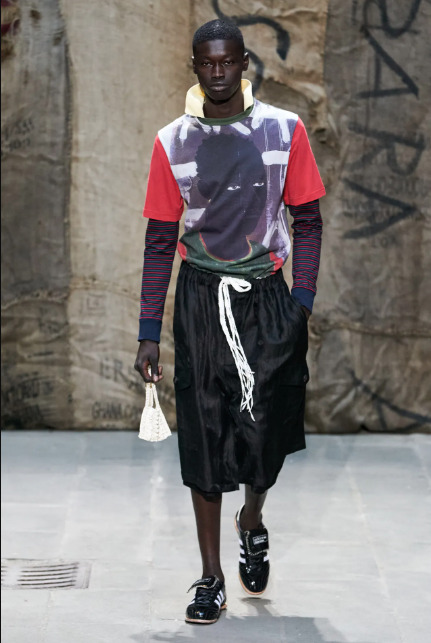

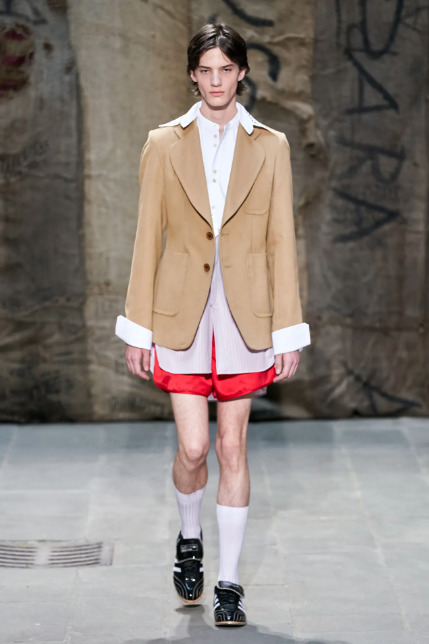
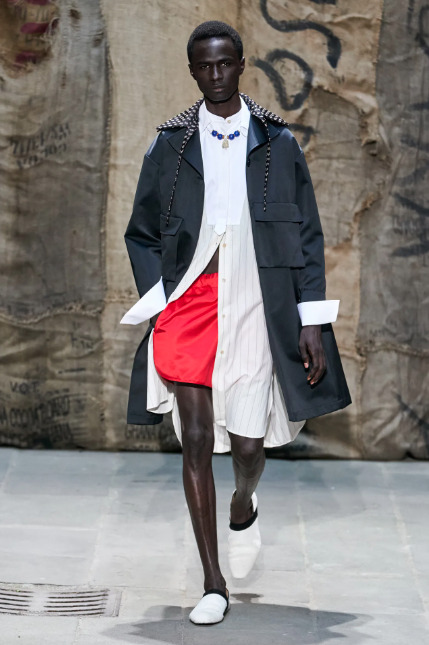



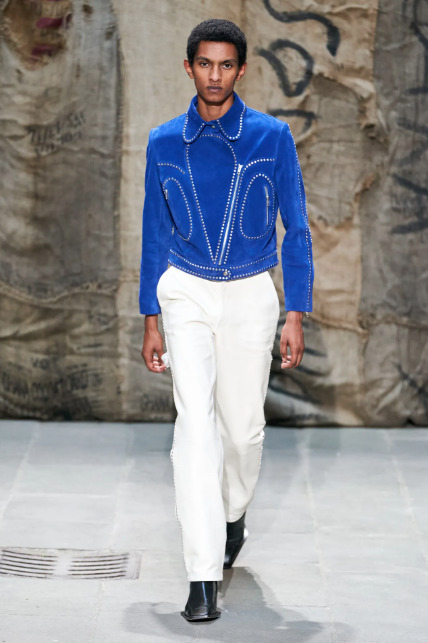
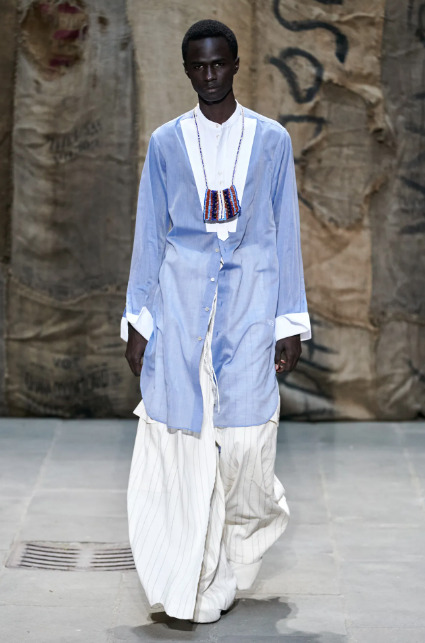
Wales Bonner SS23 Menswear
From Luke Leitch's review for Vogue
Towards the end of the press preview of this sumptuously progressive show, Grace Wales Bonner mentioned Sankofa. This bird-looking-backwards symbol of Ghana’s Akan people, she said: “means’ ‘going back to go forward.’ It is not about being nostalgic or historical. It’s about taking something from the past in order to pass it forward and make it useful for the future. And that’s the spirit of this collection.”
Wales Bonner was speaking in the central courtyard of Florence’s Palazzo Medici Riccardi, a space where one Pitti Uomo executive mentioned in passing that there had never before been a live fashion show. It was as if the Palazzo had been waiting 485 years—the time since it was once home to the first Black head of state in modern Europe—to become the outbound runway for this evening’s Sankofa flightpath.
Its starting cipher was Alessandro de Medici, who until his assassination in 1537 at the hand of a cousin ruled here as the first hereditary monarch of the Florentine Republic. His mother was named Simonetta da Collevecchio—aka “Soenara”—and was Black. She, history a little shakily relates, was a house servant who became mother to Alessandro after an encounter with either Duke Lorenzo (the official father) or Pope Clement VII.
“I wanted to acknowledge that presence but also think about the idea of arrival,” said Wales Bonner. The building also held an additional layer of resonance relevant to her practice of excavating multifaceted manifestations of cultural intersection through garments. The palazzo was commissioned by Alessandro’s ancestor Cosimo in 1444, around the same time that he hosted the 17th ecumenical council, a global gathering of Christendom which according to historian Paul Strathern included: “Armenians and Ethiopians… other entourages included Moorish, Berber, and black African attendants.”
All of this context served as evidence that the building around us has played a role in the history of Black agency and participation in Renaissance Italy. It was leveled by the intervention in the Palladian architecture around us by the artist Ibrahim Mahama, who clad the space in a huge patchwork of hand stitched jute sacks originally used to export cocoa from his home country of Ghana—where Wales Bonner met him several months ago—into the global markets. “It was important to have an equal representation within the space,” said Wales Bonner.
The opening look featured the reproduction of an artwork by Kerry James Marshall. This was another pointer towards Wales Bonner’s intention to rehang the display of menswear in Florence just as one would rehang a gallery—in order to shift the visitors’ experience. Just as effective was the slow coalescence of menswear forms—some sourced from the previously mentioned binary of contemporary European tropes of formality and informality, and others from a broader array of traditions whose boundaries were broken down by adjacency.
The macramé womenswear dresses were set with hand-made glass beads by Ghanaian artisans, and the heat-dryed hand-dyed jersey had been fashioned in Burkina Faso (Wales Bonner was building new trade routes between Africa and Italy, and Savile Row too). In menswear there was genre-busting back and forth between futuristic sportswear (which included a hand-made adidas shoe whose trefoil looked lacily artisanal) and Wales Bonner-directed, Anderson & Sheppard-cut tailoring in cashmere and camel hair that was de-conventionalized through emphasised shoulders and small sly acts of sartorial ‘wrongness’ that looked incontrovertibly right.
So back to Sankofa. What was the backward-looking-bird returning to, in order to pass forward for the future? Said Wales Bonner: “It’s about bringing an Afro-Atlantic spirit to European luxury by honoring these traditions wherever they are. And making something hybrid or integrated through working with different people.”
0 notes
Text


Press Conference in Rome.
Medici : the magnificent S3
101 notes
·
View notes
Photo


Daniel Sharman attends press Conference for “The Medici the Magnificent” in Florence, Italy - October 10, 2018.
#Daniel Sharman#wow#amazing#press conference#italy#florence#medici#season 2#medici the magnificent#lorenzo il magnifico#lorenzo de medici#ds#danielsharmanedit#tw cast#getty images
114 notes
·
View notes
Text

Lorenzo de’ Medici (1449-1492) is the most remarkable of the Medicis of Florence, richly deserving his by-name “the Magnificent” – a word originally meaning “doing great things”. He became the virtual head of the Florentine state in 1469. In 1478 the conspiracy of the Pazzi nearly succeeded in overthrowing the Medici. Lorenzo’s brother Giuliano was slain and he himself barely escaped. The result of the conspiracy was to give Lorenzo a firmer hold upon the state. He pursued with signal success the policy of his family, which was to win the favor of the lower classes and thereby make absolute their own power. He encouraged literature and the arts, employed learned men to collect choice books and antiquities for him from every part of the known world, established printing presses in his dominions, founded academies for the study of classical learning, and filled his gardens with collections of the remains of ancient art. When, however, his munificence and conciliatory manners had gained for him the affection of the higher and the devotion of the lower classes, he lost no time in breaking down the forms of constitutional independence that he and his predecessors had hitherto suffered to exist. Some few Florentines, alarmed at the progress of the voluptuous refinement, which was smothering every spark of personal independence, tried to stem the current of corruption by an ascetic severity of morals, which gained for them the name of piagnoni, or weepers. Foremost among them was the Dominican friar Girolamo Savonarola, whose eloquent appeals to the people in favor of a popular and democratic form of government and a life of asceticism threatened for a time the overthrow of the Medici. Lorenzo achieved some reputation in belles-lettres. His love poetry is the best of all that he produced, and the most distinctive characteristic in it is the note of melancholy:
"Quant'é bella giovinezza
Che si fugge tuttavia
Chi vuol esser lieto, sia;
Di doman non c'é certezza"
#perioddramaedit#history#edit#history edit#lorenzo de medici#il magnifico#florence#bookworm#bookstagram#dark academia#bookaholic#books#book aesthetics#renaissance italy#renaissance#lorenzo the magnificent#medici#medici family#alexandre dumas
45 notes
·
View notes
Text
Mariana Tudorache. Insieme a lei parliamo di Mihai Eminescu, Ioan Slavici e Florence Macleod Harper. Intervista alla traduttrice
Mariana Tudorache Insieme a lei parliamo di Mihai Eminescu, Ioan Slavici e Florence Macleod Harper Intervista alla traduttrice di Giuseppe Iannozzi Mariana Tudorache ha tradotto tre libri di grande pregio letterario e poetico: “Amando in segreto” di Mihai Eminescu, “Il mulino della fortuna” di Ioan Slavici e “Addio Russia! Una testimone della rivoluzione del 1917” di Florence Macleod Harper.…
#Addio Russia! Una testimone della rivoluzione del 1917#Amando in segreto#Florence Macleod Harper#Giuseppe Iannozzi#Il mulino della fortuna#intervista alla traduttrice#Ioan Slavici#LdM Press#Lorenzo de’ Medici Press#Mariana Tudorache#Mihai Eminescu
0 notes
Text
Charlotte Perkins Gilman "La carta da parati gialla e altri racconti",Lorenzo de’ Medici Press
Conosciuta per il suo ruolo fondamentale nella letteratura femminista, Charlotte Perkins Gilman continua a ispirare con le sue opere che sfidano le convenzioni sociali e promuovono l’uguaglianza di genere. I temi trattati sono quanto mai attuali e risuonano con le continue battaglie per l’emancipazione femminile nel mondo moderno.La carta da parati gialla raccoglie una serie di racconti ( tra cui…

View On WordPress
#Charlotte Perkins Gilman "La carta da parati gialla e altri racconti"#Lorenzo De Medici Press
0 notes
Text
Medici: Spymasters of Florence
Chapter 9: Fool Me Twice
9 chapters already oh my goodness and we still have some ways to go so i hope you’re all still enjoying it!! i can’t say how much your likes and comments mean so thank you! there’s a little bit of overlap in this chapter from last chapter so sorry you had to reread the first conversation but now we get to hear the readers thoughts i guess, anyways!!! enjoy <3
pairings; slow slowburn lorenzo x reader, (friends) francesco x reader (i told yall!)
tag list; @brynthebulldozer @mythicalamphitrite @nana035 @valravnsraven @hannahhistorian92

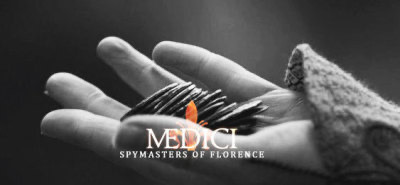
The skirt of your dress was so heavy, your desperate pulls at it leaving your leg exposed to the cold cobble below you, the adrenaline flowing through your veins stopping you from feeling it. The moment you could, you grabbed your dagger out its holster, and drove it into your opponent’s stomach. But his hold around your neck didn't falter, he simply glanced down at where you'd impaled him, and began laughing maniacally, his grip on you only tightening. Your breath hitched in your throat, not knowing what to do. A door creaked open across the street, your head snapping towards it for help. But instead, you faced Lorenzo's bedroom door, finding yourself in his bed yet again. Just a dream, a nasty dream. You relaxed into his soft bed sheets, as he noticed you were awake. Where was he returning from? Oh, Lucrezia's... of course.
"How are you feeling?" he asked, not bothering to look at you as he turned away, beginning to get dressed.
"Like stealing your bed linen," you groaned, flopping onto your back, your skin soothed by the softness.
A beat passed before he spun around to answer. "They're yours, a starting payment for last night," He had a shit eating grin on his face as he worked on the buttons of his shirt. You failed to mirror his expression. Last night cost a lot more to you then Medici bed sheets. And you imagined it would cost a whole lot more to make it up to Lorenzo.
"I really am sorry, Lorenzo." You pulled yourself away from his bed, moving closer to him. The cool morning air nipping at your bare legs as a reminder you were only wearing one of his shirts. His eyes poured into yours, his gaze unfaltering.
"No need for an apology," he pulled his jacket on before doing it up, making a mess of the buttons as he focused on keeping eye contact with you instead of them, "that's the last time I'm saying that." You still didn't believe he wasn't furious with you.
You closed the space between you two, gently dropping your hands onto his, moving them to do up the buttons for him. He didn't say anything, but his jaw clenched.
"Okay," you wondered how to approach the topic, "no apologies, but we still have to discuss it."
He looked to the ceiling as you continued with the buttons. "And we will. When I'm back."
"Back?" You were quick to remark. He had only just returned from spending the night with Lucrezia, and he was leaving again?
"The Orsini girl is downstairs. I won't be long," He almost seemed scared to say it to you. As he should be. Why was Clarice here? You were certain your little talk had dissuaded her. Honestly you expected better of her.
"I thought you said-" Lorenzo didn't give you the chance to finish your thought.
"The visit was unexpected. I was certain she didn't wish to marry. She still couldn't. But she's been waiting long enough," he continued with his explanation. You couldn't hide your anger. Lorenzo was focusing on such trivial matters when you had ended another person’s existence last night. And going to speak to Clarice when he was still having dalliances with Lucrezia? It wasn't fair... to Clarice.
"Well good luck," you kept your thoughts to yourself for once, and turned for the window as you'd finished dressing Lorenzo.
"Y/n," his hand found yours, "I shan't be long. Please wait here for me. You need some rest and it's just easier." You could tell how sincere he was.
You didn't bother fighting, or speaking at all. A simple nod sufficed.
"Thank you, lock the door after me," Using the hand holding yours, he brought it to his lips to place a kiss onto your knuckles, leaving instantly after. Why did he do that? You held the hand to your chest, confused. After a moment’s thought, you did as he said and locked the door, your eyebrows still furrowed. How peculiar. You weren't some noble woman at a ball, he's probably just stuck in his ways, a force of habit. It didn't mean anything.
A shiver involuntarily slipped through your body. You thought of just climbing back into the warmth of bed but didn't want Lorenzo to return to you that way. You didn't have anything to change into as Lorenzo decided to burn half your closet last night. You went to root in his instead, but surprise, surprise, it was all men's clothes. You knew that wouldn't bode well when you had to walk through the streets of Florence later. Instead, you made your way back to the door, trying your best to listen before unlocking it and pulling it open gently. The coast seemed clear, so you danced across the hall to what you believed to be his sister, Bianca’s, room. The door was already open a crack. You listened carefully, hoping to hear her sound asleep but there was no noise to be heard. Maybe you had slept longer than you imagined. You slipped through the crack, seeing the room to be empty. You began to wonder where she was before you caught yourself, it didn't really matter and you should really be counting your blessings. You quickly stole a dress from her wardrobe, before sneaking your way back into Lorenzo's room to get dressed. You sat on the bed beside his folded shirt, awaiting his return, fidgeting in Bianca's dress, it had been hard to fasten by yourself and didn't seem to quite sit right.
Minutes passed and there was no sign of the Medici. You had picked at your nails long enough, and decided to give into your urge to snoop. Who could blame you? It was basically your job. You made your way around Lorenzo's room, picking up some of his trinkets for further inspection, and, although notably out of character for you, you put them back. It just didn't feel right to steal from him anymore. You hated yourself for feeling that way but you couldn't help it.
Your fingers landed on a small vial in the drawer of his desk, your tube of poisons. You still had most of what you'd purchased at home, but this was your original assortment you'd made he'd taken from you. You shook it slightly as you examined it. You were still fascinated with the practice of mithridatism. After contemplating it for a moment, you took another (tiny) dose. Things couldn't get much worse for you anyways. You'd just be more patient this time.
You soon grew bored, as you weren't making any money from your rummaging, and floated back towards the door. You pressed your ear to it, but you couldn't pick up anything from the thick wood. You went to the window instead, glancing around, watching as light rainfall splashed in the puddles from last night’s downpour. No one was out for walks in the garden because of the weather, so you didn't have to worry too much about staying hidden. Your eyes trailed down to the path by the front doors, to see Clarice being helped into her chariot. So they were finished speaking. You couldn't make out her expression from where you were, but her body language gave you some hints, although you weren't sure whether her hung shoulders and dragged feet meant the marriage was on or off. You turned to face the door, expecting Lorenzo any moment. But your expectations weren't met. Minutes passed and there was still no sign of him. Your eyes wandered back to the window, the raindrops soothing as they trickled down the pane, distracting you from your inner turmoil.
A bright blue blob appeared in the corner of your eyes. You blinked to refocus them, to see Lorenzo leaving in the same blue cloak he'd worn the day you first met. He headed in the same direction as Clarice, towards the town. It was a long walk in rain, you would know. You cursed out loud, 'shan't be long' indeed. You stomped throughout his room, going back to his closet to steal the plainest cloak you could find. You considered leaving the door locked just to irritate him, but decided against it, and exited through the window.
You followed the same route you took as last night, going around the city altogether, rather than taking all the winding paths into it. You kept your head down, and your footsteps light. You still weren't one hundred percent, but you were starting to feel much more yourself now that you'd rested. You didn't feel as weak as last night, and you made a mental promise to yourself to never let yourself be that weak ever again. You weren't sure you were fully in control anymore. It all seemed so fun just a little while ago, getting all this extra coin, for basically the same work. And you couldn't lie and say sneaking around with Lorenzo de ‘Medici behind Pazzi's back wasn't thrilling. But now it was all just stress. You'd gone too far. You couldn't turn back now. And you felt like you only had so much time left on this path. The walls were closing in around you, and there was no way out.
"Is that y/n Bellondini? “A familiar voice brought you out of your spiral.
"Who's asking?" You teased, turning to face Francesco. Your chest tightened as he embraced you, somehow also feeling a sense of relief to see him.
"How are you?" He asked when you eventually pulled away.
"Glad to see you," you reply, not sure how honest you were being. His grin grew at your words. "How have you been keeping?"
"As good as I look," he stood taller as he complimented himself.
"Oh," you frowned, "I'm sorry," you continued your mocking, resting your hand on the side of his shoulder as if to comfort him.
"I haven't missed your mockery, Bellondini," his hand moved to sit atop yours.
"But you've missed me, Pazzi," you used each other's names against each other. You couldn't say you didn't miss this light hearted teasing either, but it wasn't the same anymore.
Francesco didn't say anything more, he just contained a small smirk, while you both continued to look at each other. You smiled back, although you were far from happy. You knew you could never truly be his friend after what you'd done. You could never go back to just being a Pazzi spy. You could never return to a life you didn't even realise you'd been leaving behind.
"We better get out of this rain," you spoke after a second too many had passed. The clouds were falling down with more severity as the minutes ticked by.
"We best. I was just heading home," your hands fell as the moment ended, and Francesco's grin faded.
"I'll walk you," you offered, and you did just that. You spoke of trivial matters for the short walk, halting at the entrance, where you parted your ways. You dared not enter in the way the devil dared not enter a church.
As you turned to head back home, your eyes flickered towards the docks, as if your victim would be swimming along with no worries. You were relieved to see no such thing, and no trace of your crimes left. You would never curse the rain again. Your mind wandered as you walked, would Lorenzo have returned yet? Would he even notice your absence? Maybe he would, and feel relief that he didn't have to deal with you. You recognised that you were quickly becoming a bigger problem to him than you were an asset. You also recognised you had no real leverage with the Pazzi's over him anymore. Where had he even gone? Clarice had left separately. Where else would he go in such a hurry that he couldn't even tell you. If he were truly that busy why not just inform you rather than leave you waiting. You were glad you left when you did, humiliated that you even stayed that long in the first place.
A voice in the back of your mind was whispering her name. It made sense. What was the one place Lorenzo snuck off to? But he had only seen her last night? Unless you'd thought wrong. Maybe he did stay with you all night, and went to explain now. Your curiosity got the best of you and you switched your course, making your way towards Lucrezia's house in the heart of the city. You took shelter under roofs as you ignored your better sense, and continued on your path. Why did you even care if he was with her? Because he'd left you for her. Left you after you'd quite literally killed for him. That's why.
You reached her street, hiding around the corner of a building across from her home. You didn't risk getting any closer, still not feeling in the best shape. You stood there, the rain falling down all around you, questioning yourself every second you did. You kept telling yourself to just go home, warm up and recover from recent events but you just couldn't. You stayed, watching, it wasn't anything you weren't used to. You often had to wait hours on missions, but none that you'd been so invested in. It was difficult to let your mind wander to other things, your focus was unwavering for once.
Eventually, the door opened, and you watched as you had the first time as Lorenzo stepped out. He glanced upwards at the raindrops, quickly pulling his hood up, before making his way down the street, away from you. You don't know what else you were expecting. That first night on the rooftop you'd been waiting hopefully, before bragging your advantage to Lorenzo himself. But now you no longer felt you had the upper hand.
#daniel sharman#daniel sharman x reader#lorenzo de medici#lorenzo de medici x reader#medici fic#medici: masters of florence#medici: spymasters of florence#medici#francesco pazzi x reader#francesco x reader
101 notes
·
View notes
Note
Hello ! Could you tell me facts about the life of Cesare Borgia? Thaanks.
So, I really wanted to make this a short list with basic facts, but somehow it ended up becoming a longer, detailed list with my favorites facts alongside facts that aren’t very well known or mentioned, here it goes: - Cesare received an outstanding, carefully planned education. He was brought up at Rome by private tutors until the age of twelve, in 1489 he left Rome to attend La Sapienza of Perugia, where he studied the foundations of law and the humanities, being placed under the charge of the preceptor Giovanni Vera of Archilla, to whom btw, he remained warmly attached until Vera’s death in 1503. In 1491 he continued his studies in Civil and Canon law at the University of Pisa, attending the lectures of Filippo Decio, one of most rated lecturer on canon law of his day. There he also became more acquainted with the Medici family, through Lorenzo de’ Medici sons: Giovanni de’ Medici and his brother Piero. - Paolo Pompilio, a Spanish scholar, dedicated his treatise on verse-writing, the Syllabica, to Cesare, where he praised him as ‘Borgiae familiae spes et decus’ (the hope and ornament of the House of Borgia). - His father, as Cardinal and Vice-Chancellor, invested a long list of benefices upon him, to name only a few: when he was seven years old, pope Sixtus IV conferred upon him a prebend of the cathedral’s chapter of Valencia. In 1483 he received the title of rector of Gandia and archdeacon of Játiva. Later on, with pope Innocent VIII he was granted the position of treasurer of Mallorca’s cathedral, following that of canon of Lérida, Archdeacon of Tarragona and then treasurer of Cartagena’s cathedral. By 1491, Innocent at last granted him the bishopric of Pamplona. - He learned the art of bullfighting from the Spanish members of his father’s court and it became one of his life passions. Whether in Rome or in the Romagna, at any celebration, there was almost always a bullfight and he was almost always participating himself. - He also loved hunting, so he was always looking for good hunting dogs and falcons. On May 28th, 1497 he even sent one of his men, Enrico, to Germany to request from the Archbishop of Mainz some “well-trained and sagacious hunting dogs; their quality to be more important than their number.” - He was the first person in the history of the Church to resign the cardinalate, eventually becoming commander of the Papal armies. - He was briefly hostage of the Colonna during the conflicts of the French Invasion in 1494, and later on hostage of the king of France, Charles VIII. Although that time, he escaped their camp at Velletri, with the help of a man named Francesco del Sacco, officer of the Podestà of Velletri, who was waiting for him with a horse. Cesare sped back to Rome going to the house of one Antonio Flores, where he stayed for a night and informed his father of his presence. The next day, he withdrew to the city of Spoleto, and remained there until matters cooled off. - In 1497, a sword was forged for Cesare, known as “the queen of swords”, for his visit to Naples as papal legate, to crown the new king, Frederick of Naples. Its design was attributed to many artists including Michaelangelo, but it is more likely that the artist was Pinturicchio. And the blacksmith/sword engraver was Salomone da Sesso (c. 1465- c.1504–21) who after his conversion to Christianity assumed the name of Ercole dei Fedeli. (more details about the sword here x) - Cesare appeared wearing a horned mask in the guise of a unicorn during a theatrical performance, in one of the many festivities held in honor of his sister Lucrezia’s second wedding. Unicorn are known symbols of female chastity, possibly a reference to Lucrezia and her wedding night, but it also shows off Cesare’s own sense of humour, since it was well known to all present that he was anything but a chaste man lol. And the unicorn horn, according to a Greek physician had the ability of protecting people from sickness and neutralizing poison, which could have been another humourous remark from Cesare in reference to his family’s reputation of using poison to dispose of their enemies. - His best known mistress was Fiammetta Michaelis, she was a cultured courtesan from Florence, but who lived in Rome since 1473 most likely. Her relationship with Cesare was such that even after his death in 1507, she continued to sign herself as Fiammetta Ducis Valentini (of the duke Valentino). And her will in the city archives was headed ‘The Testament of La Fiammetta of Il Valentino.” - On May 10, 1499, he married Charlotte d’Albret, and before his departure from France he appointed her governor and administrator of all his lands and lorships in France and Dauphiny. He also made her heiress to all his moveable possessions in the event of his death (a little more about that here x). On December 1501, he personally selected precious gifts to be sent to her acquired from Venice. It included moulded wax, white sweetmeats, fine sugars, syrups, nine barrels of Malvoisie, oriental spices, oranges and lemons and all kinds of cloths. - Under his patronage, the first printing press of any importance was established in Italy. It was set up at Fano by Girolamo Sancino in 1501. One of the earliest works was the printing of the Statutes of Fano for the first time in January 1502. - About his administration staff, also in the year of 1501, we know he had a beautiful young woman from Bologna named Jovanna, working for him in his chancery. She’s described as a “degnissma scriptora”, she wrote letters and maybe did other secretarial duties as well for 14 ducats. - Whether it was treachery or a legit, reasonable move against Guidobaldo's own plans of treachery against him, the fact is that Cesare acquired Urbino without bloodshed in any of the towns, in a brilliant coup that amazed the whole of Italy (and terrified the nobility lol). While leaving a military contingent at Camerino, Cesare road north through the Apennines, between Nocera and Urbino he covered more or less sixty miles in forty-eight hours with a mixed force of 2.000 men. Before anyone else knew, he had already took Cagli, inside the Duchy of Urbino. Simultaneously, two other points were taken too, Montevecchio and San Lorenzo. Di Naldo, one of Cesare’s captains came from the east. These three armies converged towards the capital of Urbino then, where they met with the castilian and the garrison was rendered by him. A few hours later Cesare himself entered the city without any resistence. - The famous Sleeping Cupid by Michelangelo that Cesare gifted it to Isabella d’Este when he took Urbino in 1502 had a history together. He had previously been the owner of this piece. Cardinal Riario Sforza bought in 1496, but apparently when he found out that the piece was a modern piece and not an antique, he didn’t wanted it anymore, so it was displayed across the street of Cesare’s palace and he bought before the end of the year and later on send it as a gift to Guidobaldo da Montefeltro, Duke of Urbino. - A popular canzona of the time, Donna contra la mia Voglia by Filippo de Lurano (c.1470-c.1520) was Cesare’s favorite song. (There is an excellent version of it too by conductor and composer Jordi Savall). - As another step to secure the unity of the Romagna, Cesare did a reform in legal administration of great importance, he established a supreme Court of Appeal, named the Rota, influenced by the famous Court of the Vatican with the same name. He appointed as The First President, a newly created office, to Antonio di Monte Sansovino, a distinguished jurist with high integrity, and who was universally beloved. This Appeal Court sat in the seven main cities of the Romagna: Fano, Pesaro, Rimini, Cesena, Faenza, Forlì and Imola. If it was necessary, this Court would sit for as much as two months. All expenses were met by a payment from each of these judicial circuits of 200 ducats per annum. - In October 1500 Pinturicchio wrote to Cesare asking for the grant of a well to be put in one of the lands pope Alexander VI had bestow on him and his descendents at Chiusi, a city in the province of Siena, but near Perugia. Pinturicchio went himself to see Cesare at Diruta to request for all the necessary permission. Cesare issued a letter to Alfano Alfani, vice-treasurer of Perugia, making the request and saying that: “he had again taken to his service Bernardino Pinturicchio of Perosa, whom he always loved because his talent and gifts; and he desires that in all things he should be considered as ‘one of ours.” This initial request wasn’t honored so Cesare wrote again to this Alfani reinforcing his wish to be granted within that year. In 1501, Pinturicchio was given an annual payment as Cesare’s personal painter as well. - Cesare hired Leonardo da Vinci as a military architect and engineer in the spring of 1501, he entrusted him with all sorts of projects, in Cesena for example he asked that Da Vinci planned a new quarter of the city with wilder streets, sidewalks, parks, and a functioning sewage system and many other improvements. He also issued papers from the city’s headquarters for the construction in Cesena of a new university building, a palace to house the Rota. - Cesare also commissioned Da Vinci to work on an alterpiece, that is now lost unfortunately, at the Santuario della Beata Vergine del Piratello, outside of Imola. Some scholars agree that Da Vinci at the very least begun this painting, but it was not finished by him. There are some sketches he made that are called: Three views of a bearded man and it’s generally accepted to be Cesare, in what might have become a portrait of him in this alterpiece. - Right after he conquered a city, it was Cesare’s policy to issue a stem proclamation against plunder, guaranteed the property of the citizens. At Forlì he took measures to safeguard the convents, listening to all complaints of ill-treatment or robbery at the hands of the soldiery. On December 7, 1500, he hanged from the windows of his headquarters, two of his own men, a Piedmontese and a Gascon soldier, who had disobeyed his orders against plunder in the town. On the 13th of the same month, other offenders followed the same fate as the first two, which showed his zeal and the level of his commitment for the interests of his Forlivesi subjects. - At Cesena, as in other places in the Romagna, that same policy was applied, the usual disorder was put to an end, and civic automony was fully restored, along with the suppresion of aristocratic feuds, which resulted on econonical security and internal peace. - During the conquest of Faenza, the only city where Cesare met a true resistance, he retired to Cesena through the winter months while the siege kept going there. One night, he was walking around the city when he found a baby girl abandoned in the street, he commanded the baby to be nursed, and settled an ample dowry on the baby’s mother until she was of marriageable age. Afterwards, when the father refused to acknowledge the girl as his own, Cesare himself acknowledged the girl and she was baptized that day. - On March 29, 1501, when he was informed of Beatrice of Naples arrival at Cesenatico, twice Queen of Hungary and of Bohemia, and sister of Frederick of Naples, he send off his staff to greet her and to present her with a 'royal gift'. He ordered his lieutenants to honor her in every city in the Romagna and the Marche region, where she made her way back to Naples. - On 1502, Cesare and his father, Rodrigo went on a boat trip to Piombino and the island of Elba so that Rodrigo could officially take possession of these territories Cesare had recently conquered. Everything went smoothly, and they were on their way back when a violent storm began, hitting them hard. During 5 days they wandered aimlessly. Everyone, but Rodrigo, were quite anxious and scared. At the second day, the crew saw an English ship, and Cesare proposed to go to this boat to request for help, but Rodrigo refused, not wanting to request help from strangers. Eventually they made it back ashore, but it was a close call there for them for awhile. - After the masterstroke at Senigallia, where he successfully arrested his conspiring condottiere, the city was in total confusion, and a part of Cesare’s infantry were starting to sack the city, so Cesare in full armour and on horseback gave orders for his men to stop the sacking immediately, he then gathered some of his captains and went about the city streets putting a stop to the abuses that were starting to happen, some soldiers however, refused to obey his orders, and they were promptly executed there for their disobedience. - On 25 October, 1506 he managed to escape the Castle of La Mota, in Spain, a fortress that at that time worked as State prison, of maximum security, and where he was imprisoned. With the collaboration of his chaplain, and a servant of the governor's, named Garcia, along with the outside help from Count of Benavente, a powerful lord from the neighbourhood, who visited him regularly, he managed to climb down the 40 meter high tower with a rope, and if memory doesn't fail me, he was the only prisoner to have ever managed to escape this prison lool.
#anon ask#ask answered#cesare borgia#césar borgia#house borgia#historical facts#a few of these facts are only found in cesare italian bios#(alvisi and sacerdote)#and some of them are not found in any biography about him at all#if the internet wasn't a thing#and if i wasn't so curious and obsessed#i'd have died without ever knowing about it basically djsdjsjd#and i find that unacceptable and it shows how his own biographers tend to ignore a lot of interesting details about his life#bc they are usually stuck on this same ridiculous formula of presenting him#and some of these info doesn't fit in the general profile they like to present him as nor with their narratives#so it's mostly ignored by the vast majority of them#anyways idk if that was what you wanted anon#but i hope you like it!#it was fun to make it#<3
126 notes
·
View notes
Text
Huntress V
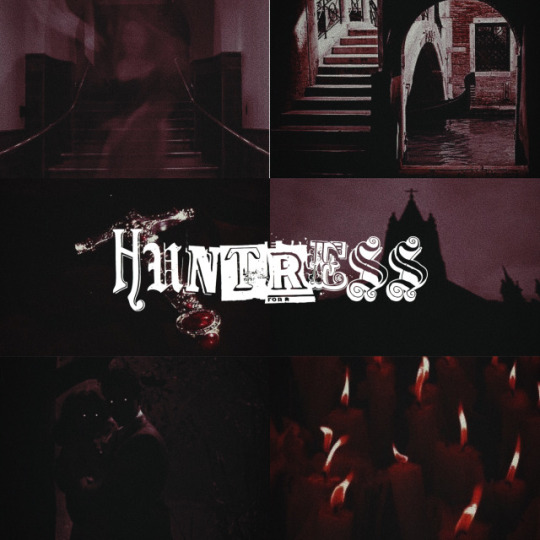
[Part I] [Part II] [Part III] [Part IV] [Part V]
When (Y/n) awoke, she was in an unfamiliar room, no longer at the doctor’s. It was fairly cramped and the windows were boarded up to prevent any sunlight from getting inside, leaving the candles on the desk as the only source of light.
The bed took up most of the room albeit it, it was small and very low down. Opposite the bed was a desk and chair — papers had already been pinned above the desk and Ezio stood with his back to her and was laying some items out over the table, seemingly taking an inventory. There was a hatch on the floor which (Y/n) assumed was the exit.
She sat up and looked around, rubbing her eyes before throwing the blanket back to examine her legs — big mistake. She gasped and pulled it back over her figure, causing Ezio to turn around to face her. The vampire had heard her wake up but didn’t feel the need to turn around until hearing her sound of distress.
“Where are my clothes?!” She exclaimed, holding the sheet over her bare chest.
“Relax. It’s been a few days and I thought they needed to be cleaned. If it makes you feel any better, I sent for a woman to change you.” He continued as he crouched down beside her, watching as she held the sheet tighter and shuffled back a little. His dark eyes locked with hers for a moment before he reached for the blanket at her feet. Her hand darted out to grab his wrist, stopping him.
“What’re you doing?!”
“Checking your bandages.” He replied, “I have no ill intentions for you, (Y/n).”
“You know I can’t believe that. I tried to kill you twice and then you saved me from execution. Why would you do that unless you wanted something?” She narrowed her eyes at him. But her glare wasn’t as hard as he had seen it before: she seemed cautious, confused and painfully aware of how vulnerable she was in that moment.
“Because I want you to change your mind.” He replied, feeling her grip of his wrist soften and moving his large hand to hold her smaller one. “You’ve been on the wrong course for so long. What will killing vampires achieve? Satisfaction? Why not go out there and kill the men who took your sisters, hmm? Kill them and everyone like them who would strip you and other witches of your freedom. Stop them from putting anyone else through that pain. Fight with me, not against me. Fight for a world where we can all choose the path we lead.” The idea seemed to roll in her mind and she sighed, not wanting to share her thoughts on it just yet and raising the sheets to reveal her bandaged legs instead.
Ezio returned to the desk and grabbed a pouch before returning to her side and removing the bandages. (Y/n) hissed when he prodded her a little too hard by accident, causing him to mumble his apologies as he inspected the wound. Her skin was raw and blistered and she winced at the mere sight.
“The doctor prescribed this ointment.” He spoke as he pulled it from the pouch and (Y/n) opened and closed her palm to signal for him to hand it over. She opened the lid and smelled the contents.
“This won’t do anything. If I had my stuff, I could get the spell to cure it.” She grumbled as she handed it back over.
“Would it still be in the Doge’s home?” He queried.
“Yes, but he’s surrounded by guards now, no doubt.” She replied, “But I’m worried I’ll suffer from infection under this doctor’s work. I’ve never trusted them, we just don’t know enough about the human’s biology yet. I’ll stick to my own remedies.”
"And there are no other copies of this remedy?" He asked, raising a hand as he stood.
"No, I came across it myself by accident after a fight when I was working with whatever ingredients I could find." She replied, frowning at her bandaged legs. "And if it's any motivation for you, that book you stole pages from is also in that bag."
"It is?" His eyes lit up, "Where have you kept your things?" He queried.
"The trunk at the end of the bed in the spare room." She replied, "Though, I'm worried that they may have got rid of my things when they arrested me."
"Va bene, I'll send someone to check and see if they can recover your belongings." He replied as he got up and reached for the handle of the hatch on the floor.
"Don't go anywhere." He finished as his head disappeared down below and the door fell back into place.
"I think my blisters are security enough for that." She rolled her eyes before swinging her injured legs over the side of the bed, holding the sheet around her form in case Ezio came back, assuring that it was wrapped securely around her slim figure.
She stood upon the wooden floor and winced at the pain in caused, gripping onto the table to sturdy her balance - it had been a few days since she last walked and she was feeling the effects of it. She opted to lean one hand on the table in order to try and get back to her usual self, not wanting to be idle anymore.
She reached towards the pages pinned to the walls - sketches and annotated diagrams. It showed a sphere was unusual markings that was called a Piece of Eden and 'the apple?' hastily written beside it as well. There were annotations about some of its known abilities: mind control, illusion and so on. (Y/n) could recall a few mentions of this artefact from the book which she had stolen from the Doge's study but these must be the pages which he had torn from it. Personally, she had been much more interested in the staff that it had documented so she thought very little of these few mentionings of the apple.
Strewn over the desk were various maps and lists: some were maps of regions in Venice with different locations circled and crossed out, some areas marked with squares around buildings. But she could not find any key to decipher what any of these meant, perhaps it was just one that Ezio had kept in his mind. There were lists of different names and information provided by contacts. There was a scroll of various papers that was bound with a black ribbon. She opened it up to reveal contracts assigned by Lorenzo de Medici.
"The Medici?!" She whisper-yelled to herself. How many people did this vampire know? The contracts spoke of enemies to the Medici rule that needed to be dealt with. Some of them were checked off by Ezio but others were yet to be completed. Perhaps he intended to finish them once his work in Venice was done?
There was a noise from below and (Y/n) looked back to the hatch, seeing Ezio climb up a ladder and re-enter the small room which they seemed to be sharing for the time being. She didn't act hastily in rolling the contracts back up again. If he wanted her to trust him then he would allow her to know everything that was going on; especially seeing as he had previously told her how much was hidden from her beforehand.
"I've sent someone to try and collect your things but we can't guarantee she'll be successful." He began before holding out a bundle of white silk and linen to her, seeing as all she had to protect her decency was a bedsheet. "I also got this for you, one of the ladies has let you borrow it until we can get your clothes back or buy you some new ones."
"Thank you." She mumbled as she took the clothing and held it out with one hand, seeing the length of it and how revealing it was.
"Is this lady a courtesan by any chance?" She scoffed as Ezio turned around to face the desk once more in order to allow her some privacy as she changed, his back now to her.
"Yes, actually. We're above a brothel." He replied and (Y/n) sighed as she stood on the bed (due to the lack of space) and dropped the sheet, pulling the shoulderless dress on over her head and pulling the thin layers of the skirt down, still feeling awfully revealed by the open-cut front of the dress and how the stay sewn into it barely contained her breasts. She almost fell to the floor in the process, her legs still weak, but she managed to support herself on the wall.
"Ok, I'm done." She huffed as she pulled the front of the dress down carefully, feeling anxious about her lack of clothing underneath, all while not wanting the bodice to shift with it. Ezio looked over his shoulder and his eyes widened for a moment before flickering down her body and a smirk pulled at the corner of his lips before he looked away once more.
"I saw that," (Y/n) grumbled as she sat down, letting her legs fall off the side of the bed.
"It was only a quick look." He replied in a laddish tone with a hearty laugh at the end.
"Not for you, it wasn't. I wasn't born yesterday, Ezio, I know how quickly your kind can move when wanted." She was replied with another laugh from him.
"Art should be admired, no?"
"You're not doing yourself any favours in getting in my good books here." She finished as she walked over to one of the boarded-up windows.
"Don't touch those." He said, not raising his gaze from one of the maps on the table.
"What's stopping me?" She countered, knowing that she had the ability to severely injure him just by prying a board back and allowing the sunlight to pour in. An arm wrapped around her torso, restraining her arms by her sides and a blade was pressed to her throat in a moment. The cold metal rested against the hot skin of her neck and she reeled her head back to try and put some distance between herself and the weapon, ending up leaning her head back onto his shoulder.
"This." He growled in her ear, not wanting her to get any ideas about attacking him while he was vulnerable during the time that he was treating her. He truly wanted the best for her but he would never be able to achieve that if both of them didn't command mutual respect. She twisted her body to the left a little, elbowing him in the gut and giving her the moment she needed to turn around and shove him away.
"Still not doing you any favours for getting on my good side." She grumbled as she leaned against the wall, crossing her arms. He didn't seem to mind her shoving him, it not really having much of an effect seeing as she was already weakened by her injuries. "Don't do that again." She mumbled, making her way over to the desk to watch what he was doing. After realising he had taken out a very specific map of a building, she became curious as to what it was.
"What're you looking at?" She asked, wrapping her arms around herself as she felt a sudden chill.
"It's a map of the Basilica, there's something that I need. . . Would you shut up?" She was taken aback for a moment after he spun in her direction to say that, opening her mouth to retort when she saw that he was, in fact, looking behind her. She turned her head and jumped backwards with a yelp, her back hitting Ezio's chest in the small space that was the secret loft of the brothel. Suddenly she understood the chill.
She'd never been sensitive to spirits in the day, perhaps that's why Elizabetta's ghost had managed to appear behind her, undetected.
Her dark locks fell down her back and her eyes were a piercing green, poking like needles into whoever caught a glimpse of them. Her skin was strikingly pale and (Y/n) could see the punctures over her neck so easily in their short distance - a reminder of what Ezio was capable of doing to her. The naked ghost took a step closer as she continued to speak silently, lips moving but not a word coming out.
Whether he meant to or not, Ezio's arm made its way around (Y/n)'s waist, trying to push her behind him in the small distance. The witch turned her head to glance up at him, seeing the look of irritation on his face as he regarded the dead woman.
"I've heard enough. You won't scare me Elizabetta, and you won't make me change my mind." There was a pause as she clearly scoffed, (Y/n) only wishing she could hear what the spirit was saying. "Why would I listen to you? I know that your only goal is to see me fail." His voice was rising and it was clear to (Y/n) that Elizabetta had hit a nerve.
"Begone, you're no longer welcome here for the time being." (Y/n) cut in, watching as the woman's emerald eyes narrowed angrily, somewhat surprised that the huntress had even cut in before she vanished like smoke.
"What did she say?" (Y/n) quizzed, turning around to face him.
"She. . ."He seemed to trail off as he looked down at the woman in his arms, his hand resting on her lower back, tilting his head down to meet her gaze before closing his eyes. He sighed and stepped away, turning around, "I'm not entirely sure yet, all I know is she was trying to get under my skin and she succeeded to a degree." He reached a hand out to smooth down the top of her hair.
"Get some rest, it'll do you no good if you tire your legs out. We're going to be moving once the sun sets then I'll be heading out to see what I can find out about the Doge's whereabouts." (Y/n) didn't like being told to sleep as though she were a child and it was her bedtime.
"Fine, but I won't be staying inside your next hideout while you look for the Doge. If your courtesan doesn't return my things, I'll have to retrieve them myself and if I can't then I'll have to buy some new clothes. You may think that I'm fragile because I’m a witch, Ezio," She added as she sat down and pulled the blanket over her lap, "but it hasn't stopped me in the past and now that I have a new score to settle, it certainly won't stop me now."
"Revenge is a painful road, belleza," Ezio spoke wearily, recalling what his own path was.
"And it seems it's a pain we both know all too well."
#Ezio#ezio auditore da firenze#ezio auditore#ezio x reader#ezio auditore imagine#huntress#vampire#vampire au#ezio auditore vampire au#au#witches#halloween special#spooky season#assassins creed#assassins creed 2#ac#ac2#assassins creed x reader
22 notes
·
View notes
Text
Anemos, l'uomo e il divino nel racconto di Guarducci
(ANSA) – ROMA, 04 FEB – Doppia proiezione a Roma e Firenze, il 6 e l’8 febbraio, di ANEMOS – Il Vento, diretto e prodotto da Fabrizio Guarducci (Una sconosciuta – Mare di Grano), prodotto e distribuito da FAIR PLAY. Liberamente tratto dal romanzo ‘Theoria’ dello stesso Guarducci, edito da Lorenzo De’ Medici Press, ha un cast internazionale composto da Vincent Riotta, Marc Fiorini, Alessio Di…
View On WordPress
0 notes